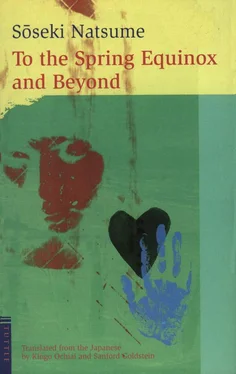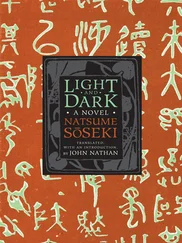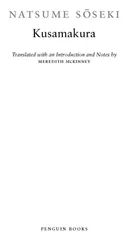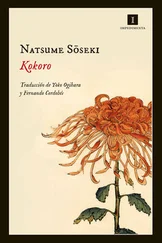Natsume Soseki - To the Spring Equinox and Beyond
Здесь есть возможность читать онлайн «Natsume Soseki - To the Spring Equinox and Beyond» весь текст электронной книги совершенно бесплатно (целиком полную версию без сокращений). В некоторых случаях можно слушать аудио, скачать через торрент в формате fb2 и присутствует краткое содержание. Год выпуска: 2006, Издательство: Tuttle Publishing, Жанр: Классическая проза, на английском языке. Описание произведения, (предисловие) а так же отзывы посетителей доступны на портале библиотеки ЛибКат.
- Название:To the Spring Equinox and Beyond
- Автор:
- Издательство:Tuttle Publishing
- Жанр:
- Год:2006
- ISBN:нет данных
- Рейтинг книги:5 / 5. Голосов: 1
-
Избранное:Добавить в избранное
- Отзывы:
-
Ваша оценка:
- 100
- 1
- 2
- 3
- 4
- 5
To the Spring Equinox and Beyond: краткое содержание, описание и аннотация
Предлагаем к чтению аннотацию, описание, краткое содержание или предисловие (зависит от того, что написал сам автор книги «To the Spring Equinox and Beyond»). Если вы не нашли необходимую информацию о книге — напишите в комментариях, мы постараемся отыскать её.
To the Spring Equinox and Beyond — читать онлайн бесплатно полную книгу (весь текст) целиком
Ниже представлен текст книги, разбитый по страницам. Система сохранения места последней прочитанной страницы, позволяет с удобством читать онлайн бесплатно книгу «To the Spring Equinox and Beyond», без необходимости каждый раз заново искать на чём Вы остановились. Поставьте закладку, и сможете в любой момент перейти на страницу, на которой закончили чтение.
Интервал:
Закладка:

Conclusion
 Conclusion
Conclusion
Keitaro's adventures began with a story and ended with one. The world he had wanted to know was at first lying far off. Of late it lies just before his eyes. But in the long run he looked like an outsider who could neither enter that world nor play any part in it. His role was merely that of a kind of reporter who constantly puts a telephone receiver to his ear to listen to "the world."
Through Morimoto's lips he heard fragments of the vagabond life. But these fragments were quite superficial, composed only of outline and surface. And so they served only to inflate Keitaro's mind with innocent diversions, a mind already filled with wild curiosity. Yet through a gap in that mind inflated with fuzzy tales of adventure, Keitaro was able to catch sight of the image of Morimoto as a human being hovering between dream and reality. In addition to this knowledge of a form of human life, Keitaro had acquired both a sympathy and antipathy to Morimoto as a human being.
From Taguchi, that practical man of affairs, Keitaro learned something of the way a man views society. And at the same time he heard from Matsumoto, who had called himself a high-class idler, a portion of his view of life. Engraved on Keitaro's mind was the contrast between these two persons who, though connected by close social ties, were utterly opposite types. Knowing them made him feel that his own worldly experience had widened somewhat. But that experience extended only in breadth, hardly in depth.
Through the lips of a woman called Chiyoko, Keitaro heard about the death of a child. The death described by her was different from death as he imagined the world takes it to be. It drew out his finer feelings as though he were observing a beautiful picture. But mingled in that fine feeling were tears — tears not so much forced to try to escape pain, but shed in the sense of desiring to embrace a sorrow as long as possible. As an unmarried young man, Keitaro had little sympathy for young children. Still, the death of a beautiful child buried in a beautiful way aroused in him feelings of pity. It was the sad tale of an infant girl born on the eve of the Doll's Festival as though her fate had been that of a doll.
From Sunaga, Keitaro was surprised to hear of the slight dissonance between a mother and son. Keitaro had his own mother in his own hometown. But their relationship, while far from being as intimate as Sunaga and his mother's, did not have as entangled a fate as that of his friend. Keitaro had absolutely no doubts about how to understand the relationship with his own mother, since he was her child; at the same time he had been resigned to its prosaic quality. A more complicated relationship between parent and child, even though he could imagine it, could not really be felt by him in its reality. He thought his view of such connections had been much more deeply delved into, though, through learning about Sunaga's situation.
He heard too from Sunaga about his relationship with Chiyoko. And he wondered if eventually the two were made for one another as husband and wife, or whether they were to continue as intimate friends, or else remain at odds as enemies. These doubts had made Keitaro, driven half by curiosity, half by goodwill, run to Matsumoto. He unexpectedly discovered that Matsumoto was not merely a bystander observing the world with an imported pipe in his mouth. Keitaro heard a detailed report from him on what he had thought of Sunaga and how he had dealt with him. And Keitaro had also been fully informed as to why Matsumoto had felt compelled to treat Sunaga as he had.
In retrospect, Keitaro's career since his departure from school, at which time he had aspired to come into contact with the real world, was nothing more than his proceeding here and there among various people and listening to their tales. The one instance in which knowledge or feeling had not been imparted to him through the ear was limited almost entirely to the time he had stood at the Ogawamachi streetcar stop with the precious cane in his hand and had followed the man in the salt-and-pepper cloak after he had left the streetcar and gone into a Western-style restaurant with a young woman. Even that moment, when viewed at present on the board of memory, was mere child's play, hardly to be designated as adventure or exploration. True, it was through this experience that Keitaro had found a job. But as a man's experience the action proved serious only to himself; to the eyes of others it was ridiculous in its significance.
In short, all the knowledge and feeling Keitaro had recently received about life came by way of his eardrum. A series of long tales beginning with Morimoto and ending with Matsumoto had moved him at first widely and superficially and then, by degrees, deeply and subtly until the series of tales ceased abruptly. But, after all, Keitaro himself could not enter their world. And that was the point where he felt something unsatisfactory and at the same time something felicitous. In one sense he cursed the snakehead for his dissatisfaction and in another blessed it for his happiness. And then looking up at the great firmament, he thought of how this drama, which seemed to have come to a sudden halt, would hereafter flow and turn forever.

Translator's Afterword
A great deal has been written about the life of Soseki Natsume (1867–1916), so there is perhaps no need to recount a detailed biography here. It may be sufficient to remind readers that his boyhood was psychologically though not materially painful; that he seriously began to study English at the famous First Higher School in Tokyo; that he majored in English at Tokyo University; that he studied for almost two years in London as a government scholar; that he succeeded Lafcadio Hearn as lecturer at Tokyo University; and that he jolted academic and literary circles in 1907 by resigning from the University and other institutions at which he was employed as a teacher and by accepting an offer from the Asahi Shimbun, the largest daily newspaper in Japan at the time, to begin serializing his novels in its columns. His nine major novels were written for the Asahi.
Not enough has been written in English, however, about Soseki's newspaper career. That a prestigious member of a prestigious university could take the "inferior" role of a newspaper novelist did indeed jolt the intellectuals of the Meiji era, a time when a journalist's status was quite lower than it is today, but the move seems typical of Soseki. Early in his career, in 1895, he had taken an "inferior" position as a high school teacher of English in Matsuyama, a town on the island of Shikoku — a relatively remote part of Japan — removing himself by choice from the active literary and intellectual scene in Tokyo. It would seem that life in Matsuyama would be a total decline for one with Soseki's brilliant academic record and artistic, philosophical, and creative bent. Yet because of his own belief in self-assertion and independence and because of his own insistent questioning of life and its perpetual opposites, what seems startling to us had begun in the early Soseki and persisted until his death. Soseki continues to fascinate us because of the tensions between what a public expects and what the writer's own inner world makes immediate and imperative. *
Soseki's life as a lecturer at Tokyo University and a full-time professor at the First Higher School, he discovered, lessened the time that he could devote to writing, despite the fact that he had been able to create his satiric work I Am a Cat (1905-6) and several stories, in addition to poems and scholarly articles. He revealed in letters that teaching brought him less and less satisfaction. On May 9, 1905, he wrote, "I am a teacher, but it seems more agreeable to my nature to establish myself as a hack writer than to be a successful teacher. So henceforth I intend to make an effort to cut a figure in the literary world." And on September 17, 1905: "My time is wasted every day over visitors. On reflection, I've come to remember that I ought not to be doing this until my death. It is going against nature unreasonably to try to do so many things at once — teaching at three different schools, receiving so many guests and visitors, studying freely for myself, and doing creative work as well. I'm essentially a man of few wants who will be content if I am able to write during my whole life two or three works that will seem satisfactory to myself; if this is possible, I don't care in the least about other things. But to do that I've got to eat beef and eggs, and because of such a requisite, it has come about that I have been forgetting my own nature in that I am following, to my infinite regret, a profession against my will. (This sounds ridiculous, doesn't it?) Anyway, what I want to quit is teaching, and what I desire to do is creative work."
Читать дальшеИнтервал:
Закладка:
Похожие книги на «To the Spring Equinox and Beyond»
Представляем Вашему вниманию похожие книги на «To the Spring Equinox and Beyond» списком для выбора. Мы отобрали схожую по названию и смыслу литературу в надежде предоставить читателям больше вариантов отыскать новые, интересные, ещё непрочитанные произведения.
Обсуждение, отзывы о книге «To the Spring Equinox and Beyond» и просто собственные мнения читателей. Оставьте ваши комментарии, напишите, что Вы думаете о произведении, его смысле или главных героях. Укажите что конкретно понравилось, а что нет, и почему Вы так считаете.












